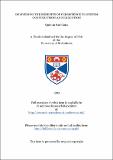Delivering the benefits of persistence to system construction and execution
Abstract
In an orthogonally persistent programming system the longevity of data is independent of its other attributes. The advantages of persistence may be seen primarily in the areas of data modelling and protection resulting from simpler semantics and reduced complexity. These have been verified by the first implementations of persistent languages, typically consisting of a persistent store, a run-time system and a compiler that produces programs that may access and manipulate the persistent environment. This thesis demonstrates that persistence can deliver many further benefits to the programming process when applied to software construction and execution. To support the thesis, a persistent environment has been extended with all the components necessary to support program construction and execution entirely within the persistent environment. This is the first known example of a strongly-typed integrated persistent programming environment. The keystone of this work is the construction of a compiler that operates entirely within the persistent environment. During its construction, persistence has been exploited in the development of a new methodology for the construction of applications from components and in the optimisation of the widespread use of type information throughout the environment. Further enhancements to software construction and execution have been developed that can only be supported within an integrated persistent programming environment. It is shown how persistence forms the basis of a new methodology for dynamic optimisation of code and data. In addition, new interfaces to the compiler are described that offer increased functionality over traditional compilers. Extended by the ability to manipulate structured values within the persistent environment, the interfaces increase the simplicity, flexibility and efficiency of software construction and execution. Reflective and hyper-programming techniques are also supported. The methodologies and compilation facilities evolved together as the compiler was developed and so the first uses of both were applied to one another. It is these applications that have been described in this thesis as examples of its validity. However, the methodologies and the compilation facilities need not be inter-twined. The benefits derived from each of them are general and they may be used in many areas of the persistent environment.
Type
Thesis, PhD Doctor of Philosophy
Collections
Items in the St Andrews Research Repository are protected by copyright, with all rights reserved, unless otherwise indicated.

